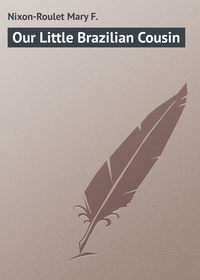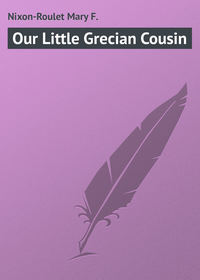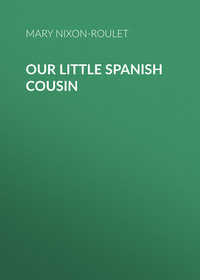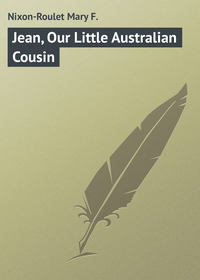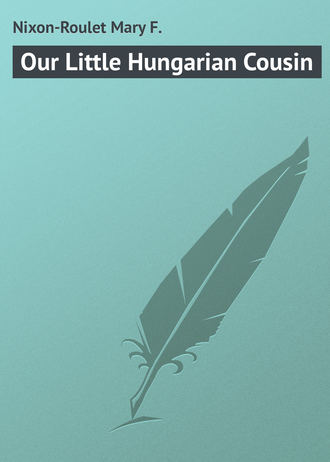 полная версия
полная версияOur Little Hungarian Cousin
The driveway wound through beautiful grounds, and through the trees were seen glimpses of the Danube. The house itself was white and stood at the crest of the hill overlooking the river.
"This place belongs to the Count Ándrassy," said the Baroness. "He has also another place in the Aföld and is very wealthy. When my grandfather went to visit his grandfather in the old days, they once took the wheels from his carriage and tied them to the tops of the tallest poplar trees on the estate to prevent his leaving. Another time they greased the shafts with wolf fat, so that the horses would not allow themselves to be harnessed up, for they are so afraid of the wolf smell. Still another time they hid his trunks in the attic so that it was three months before my grandfather finally got away.
"That was old-fashioned hospitality. Here we are at the door. Sit quietly here and I will return," and the Baroness sprang down. There was a swish of her silken skirts and the front door closed behind her.
The children chattered gaily to each other of all they had seen and heard since they had left Harom Szölöhoz, and Marushka said:
"It seems so long since we have left the village, Banda Bela; somehow it seems as if we would never go back."
"I think you never will." Banda Bela spoke a little sadly. "Were you happy there, Little One?"
"Oh, yes," she said brightly. "I was happy with you and Aszszony Semeyer. Only, when I saw other children with their mothers, there was the ache right here – " she laid her hand on her heart.
"I know," said Banda Bela. "I have that always. Only when I play my violin do I forget."
"But I cannot play the violin, nor can I do anything, only embroider that horrible Himmelbelt," and Marushka pouted, while Banda Bela laughed at her.
"Think how proud you will be some day to show that Himmelbelt to your husband," he said, but just then the Baroness and the Count came out of the house together.
"What do you think?" the Baroness asked the Count.
"I think you are right, but Maria shall decide," he answered. "We will say nothing to her and her heart will speak."
"Come in, children," said the Baroness, who looked strangely excited. Her eyes shone and her cheeks were flushed, while the Count's face was pale as death and he looked strangely at Marushka.
"Banda Bela," said the Baroness, "the Countess is not very well. She loves music as you and I do, and I want you to come in and play for her. She is very sad. Once she lost her dear little daughter, and you may play some gentle little songs for her. It may give her pleasure. It is a beautiful thing, Banda Bela, to give pleasure to those who are sad."
The Baroness chattered on as they entered the house. Marushka looked up at the Count's face. Sad as it was she felt drawn toward him. She saw him watching her closely and smiled up at him with the pretty, frank smile which always lighted up her face so charmingly.
"High-Born Count," she said shyly, "I have to thank you for the first present I ever received in all my life."
"What was that, Little One?" he asked.
"The top boots which Banda Bela bought for me at the fair at Harom Szölöhoz. They were bought with the florin you gave to Banda Bela for his playing. They were so nice!" She dimpled prettily.
"I am glad they gave you pleasure. Come, we will go in and hear Banda Bela play," said the Count, holding out his hand. Marushka slipped her hand into his and he led her into the house, entering by the large hall, on the walls of which hung deer horns and wolf heads, while a huge stuffed wolf stood at one end, holding a lamp in his paws. The Count was a great sportsman and had shot many of these animals himself in the forests of the Transylvania.
Banda Bela tuned his violin and then began to play. It seemed to Marushka as if she had never before heard him play so beautifully. Many things he played, all soft and dreamy, with a gentle, haunting sadness through them, until at last he struck into a peculiar melody, a sort of double harmony of joy and sorrow, which he had never played before.
"What is that, Banda Bela?" demanded the Baroness. "Who wrote it, what are the words?"
"If you please, Your Graciousness" – the boy flushed, "it is but a Gypsy song of sorrow. The words are but in my own heart."
"Strange boy," she thought, but at that moment the door opened and a lady hastily entered the room. She was tall and very beautiful, with great masses of corn-coloured hair and deep blue eyes, but her face had a look of terrible sadness.
"Arpád!" she exclaimed. "What is this music? It makes me weep for my lost one and I am nearly blind with weeping now." Her eyes, seeking her husband's, fell upon Marushka, who during the music had been leaning against the Count, his arm around her. The Countess' eyes travelled up and down the little figure, then sought her husband's face with a sort of eager, frightened questioning.
"Arpád!" she cried. "Arpád! Who is this child?"
"Maria, my dearest! I have brought her here that you may tell me who she is," he said, trying to speak calmly.
She drew the little girl toward her and Marushka went willingly and stood looking into the sweet face of the Countess.
"Such a likeness," whispered the Baroness. "They are as like as two sisters."
Then, all in a moment, the Countess gathered Marushka into her arms and covered the child's face with kisses. "You are mine," she cried, tears streaming down her face. "Mine! Arpád! I know it is our little daughter come back to us after all these years. My heart tells me it is she!"
Marushka looked frightened for a moment, then she clung around her mother's neck, and the Baroness quietly drew Banda Bela from the room. From the hall the sound of the Gypsy boy's violin came as he played, with all his soul in his touch, the song of his father:
"The hills are so blue,The sun so warm,The wind of the moor so soft and so kind!Oh, the eyes of my mother,The warmth of her breast,The breath of her kiss on my cheek, alas!"THE END1
Smallpox.
2
Swine-herd.
3
Ox-herd.
4
Horse-herd.
5
A famous Hungarian patriot.
6
Breakfast.
7
Labourers employed by the year.
8
Lord of the estate.
9
Small coin.
10
Room.
11
Salable daughters.
12
Celebrated drive in Buda-Pest.
13
Hungarian Magna Charta.
14
"Come to me."




